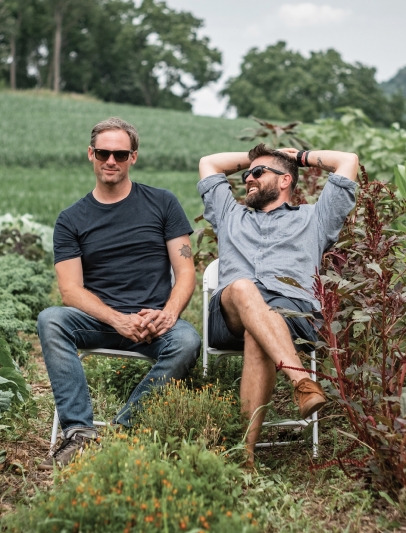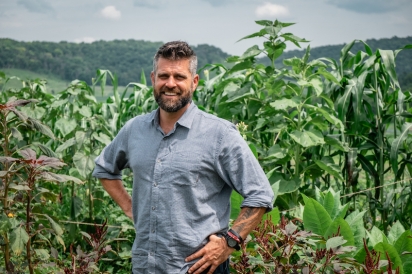How Family and Food Intertwine
Q: Recently it was announced that you are the new host of Wisconsin Foodie. How has that been going so far? What has been the public reaction to that
and how has your life changed as a result?
A: The reaction has been overwhelmingly positive, and I think that people are excited to see some of the passion that I’ve always embodied in the kitchen translated into the stories of Wisconsin. It’s impacted my life greatly. I think that being from the western part of Wisconsin has afforded me a little bit of anonymity. But that slowly rolls over, and I truly feel really honored and blessed for the opportunity to talk about the wonderful stories and the people that make this state great.
Q: Now, how do you find a balance between your life in the kitchen and life on the TV set?
A: I have to give a shoutout first and foremost to the staff at the Driftless Café. They do an amazing job, and they’re currently rebranding themselves. When Chef Mary Kastman came into the fold, it was the kind of directive that she needed to take the café and its ever-rotating menu and personalize it to herself. They’ve stepped up to the plate in a huge way. The balance for me now is making sure that we are telling the authentic tales of Wisconsin, stories that are culturally holding a line, so that we see the different cultures that come into Wisconsin and how they amalgamate with this idea of who we are and what we do. In a lot of ways, it’s like being a chef. We’re taking ingredients from different parts of the state and putting them together to make one beautiful, composed dish.
Q: Life in the kitchen is filled with long, hard, late nights and life on the road with a show can also be tough. How do you balance that with your family life?
A: My wife Ruthie is my rock, and I think that for anyone who finds themselves in this position, nine times out of ten they have a Ruthie behind them to support them. There are days when I feel, quite frankly, thin. But Ruthie is there pushing and making sure that schedules are lined up; that really keeps me going. My kids sometimes don’t realize the spectrum of how special of an opportunity Wisconsin Foodie is because we do live in a rural area, but last night we had a catering event and, I’m not joking, at the end of it I probably signed 60 autographs. It just so happened that my fifteen-year-old daughter was working as the front of the house staff, and she told me at the end of the night that she was really proud and excited to say that I’m her Dad, and that for me as a father is so rewarding.
Q: Can you tell us more about your kids?
A: Ava is fifteen years old. Ruthie and I were young parents, so at 24 she came into our lives and I can say with honesty it was the first time that I felt this sense of unconditional true love, and that never goes away. It’s been my goal to raise a daughter who is fiercely independent and strong, so she and I have done many wilderness trips together to try and cultivate that strength. My son, Ben, is fourteen, and he’s the athlete of the family. He loves baseball, basketball, football and spends as much of his time playing as he possibly can. He’s definitely the witty, smart, sarcastic member of the group, so he’s always keeping us on our toes. Silas, our youngest, is the epitome of compromise in a marriage. When you enter into relationships, you inevitably make compromises for your partner. At the time, Ruthie and I were living in Madison with Ava and Ben. I had been working at Epic Systems as a chef when Ruthie said that she really wanted a third baby, and I said that I really wanted a restaurant. Silas is seven this year, and we’ve had the restaurant for six years. So, in the end, Ruthie won, but I won too. Our family wouldn’t be complete without Silas.
Q: When my own son was born, a constant conversation topic in our family was how we would approach food and our own personal food philosophies with him. How did you approach curating your children’s palates?
A: I think most people would make the assumption that because we own a restaurant that specializes in local, organic food that our cultivation of food and our food ethics are very strong. But the reality of the situation is that I honestly haven’t worked less than 70 to 75 hours a week for about eight years, so the opportunity to raise my kids through food arises when they come into the restaurant. It’s amazing to watch their palates grow. Now, when I take my kids out to eat I can show them some of the things that I’ve uncovered as a chef, like how you come in with a pre-set position of how something tastes. I ask my kids to close their eyes and describe to me what they’re tasting. When we were dining at a high-end Italian restaurant, I was asking my sons to try the different olive oils that the chef had brought out for us to sample. Ben closed his eyes, and he had the mental picture of tasting a grassy field on a warm summer day, which is making a food memory. That’s how we refine those palates so they understand what they’re tasting.
Q: Do you let your kids eat fast food or junk food? What are your limits with that?
A: Yeah, I can’t lie. Ruthie is a terrible cook, so she grabs food from wherever she can. We both have busy schedules. With a fifteen-year old, fourteen-year-old and a seven-year-old, we are constantly on the go. But Silas has literally grown up in the Driftless Café. He views it as an extension of his home and as an extension of himself, so he actually has his own beaten path when he walks in the back door. He shoots down to the pastry department, rubs shoulders with the pastry chef, gets himself a little sweet snack, hangs out in the pizza station for a while until they want him to go away, after which he cons them for a pizza, and then shakes down people for quarters to hit the candy machine for kids with cancer in the lobby. I would love to say that we live in this beautiful, holistic, rich, healthy lifestyle but, at the end of the day, we’re busy parents. We’re just trying to make it all work.
Q: What were some of the food philosophies that you learned as a kid?
A: I fall back on those childhood traditions all the time. We grew up very poor outside of La Farge, Wisconsin, which is a fairly impoverished area. So, first and foremost, gardening was big for us. My mom canned, preserved and froze a lot of food. My dad hunted, so there was a lot of venison and wild game that we ate. They also bought sides of steers or half of a hog. As a working chef, I realized my mother had been feeding me variations of the classical recipes that I was learning for years before I knew of them. We didn’t have restaurants for take out food, and going out to eat was a really special occasion; usually punctuated by a birthday or a holiday when we were traveling. So finding my identity in food was really more about being able to tell my story as a human and where I grew up and the philosophies that surrounded us through an artistic medium.
Q: If there was a meal that summed up your childhood, what would that meal be?
A: I don’t know if I could actually articulate that, but I can remember after school going down to the basement where my mom had all the canned goods and eating peaches that my grandfather brought over from Michigan. I remember fondly sitting in the basement reading books and eating whole jars of those peaches, and some of those flavors still come back to me. When I taste pickled stuff or even some of my mom’s cooking, I taste memories. Anything out of a garden, too. Fresh picked produce that’s still warm from the sun. There’s nothing like it.
118 W Court Street
Viroqua, WI 54665






